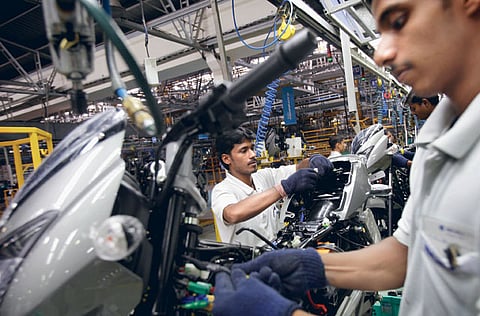India budget: Growth focus to sideline fiscal consolidation
In boosting growth, government faces some major policy trade-offs

Dubai: A week away from the unveiling of India’s national budget, economists, market analysts and financial commentators say, Finance Minister Nirmala Sitharaman will focus more on ways to ramp up government spending in the face of the third wave of COVID-19 crisis hitting the economy.
The economy was in the middle of a strong recovery in the second half of the financial year when the massive surge in infections led by the Omicron variant across the country has once again disrupted economic activities and growth momentum.
In its second financial stability report, the Reserve Bank of India (RBI) said the Omicron variant remains a major challenge for the economy along with rising inflationary pressure. However, the central bank noted that banks in the country are strongly positioned to face any challenges that may arise due to surging Omicron cases. But the RBI indicated that prolonged disruption due to Omicron could lead to a spike in bad loans next year. Another major concern highlighted by the central bank is rising inflation, which can be countered by stronger supply-side measures, especially to contain food and energy prices.
With economic growth facing headwinds from the new wave of infections, rising inflationary pressures, potential hikes in global interest rates leading to capital flight combined with limited fiscal space will make the choices difficult for the finance minister.
Austerity can wait
In the face of high unemployment and the possibility of GDP growth faltering, the government faces some major policy trade-offs in which fiscal discipline is likely to take a back seat.
Amid strong economic recovery in the second half of 2021, the government was able to shrink its fiscal deficit from 9.2 per cent in 2020-21 to an estimated 6.8 per cent in 2021-22. With the rising compulsion on boosting growth with higher spending, analysts say fiscal consolidation is likely to become a casualty.
Economists at the nation’s largest lender State Bank of India (SBI) have urged the government to budget for nursing the pandemic-ravaged economy and not to focus too much on fiscal consolidation as there is a need for more stabilisation measures to sustain the fledgling recovery.
“And one of the best way to begin the new fiscal is to complete the share sale of LIC this fiscal. This can go a long way in repairing the overstretched balance sheet which in turn will bring down fiscal deficit to a much lower 6.3 per cent in 2023,” SBI chief economist Soumya Kanti Ghosh said in a pre-Budget note.
According to a recent survey of 10 economists by MoneyControl.com, an online portal, the government is likely to meet its deficit targets in 2022, while compulsions to regain growth momentum is likely to see if falling behind in meeting deficit targets in 2023.
“The upcoming budget faces acute policy trade-offs between nurturing a nascent growth recovery and diminishing fiscal space with challenging debt dynamics,” noted Madhavi Arora, lead economist at Emkay Global Financial Services.
Focus on job creation
While the agriculture and related rural sectors are expected to get significant spending allocation, economists say the 2022 budget’s focus should be very much on the revival of private investment and job creation. This is likely to be done through a continued focus on capital expenditure.
Tax collection throughout the last year has seen massive growth. Analysts and market strategists say tax buoyancy gives the government rare luxury for increasing spending and/or consolidating the fiscal without the usual constraints.
“If the government focuses on consolidating the fiscal, we expect financials to outperform. If it prefers spending, consumer discretionary and industrial stocks will likely fare better,” said Morgan Stanley India’s Equity Strategist Ridham Desai said in a report.
Amid the rising GDP growth concerns, economists favour gradual fiscal consolidation and higher government spending. The government is likely to face significant revenue shortfall as major disinvestment initiatives such as the initial public offering (IPO) of LIC and BPCL sale is unlikely to rake in enough resources to cover the spending requirements of 2022.



